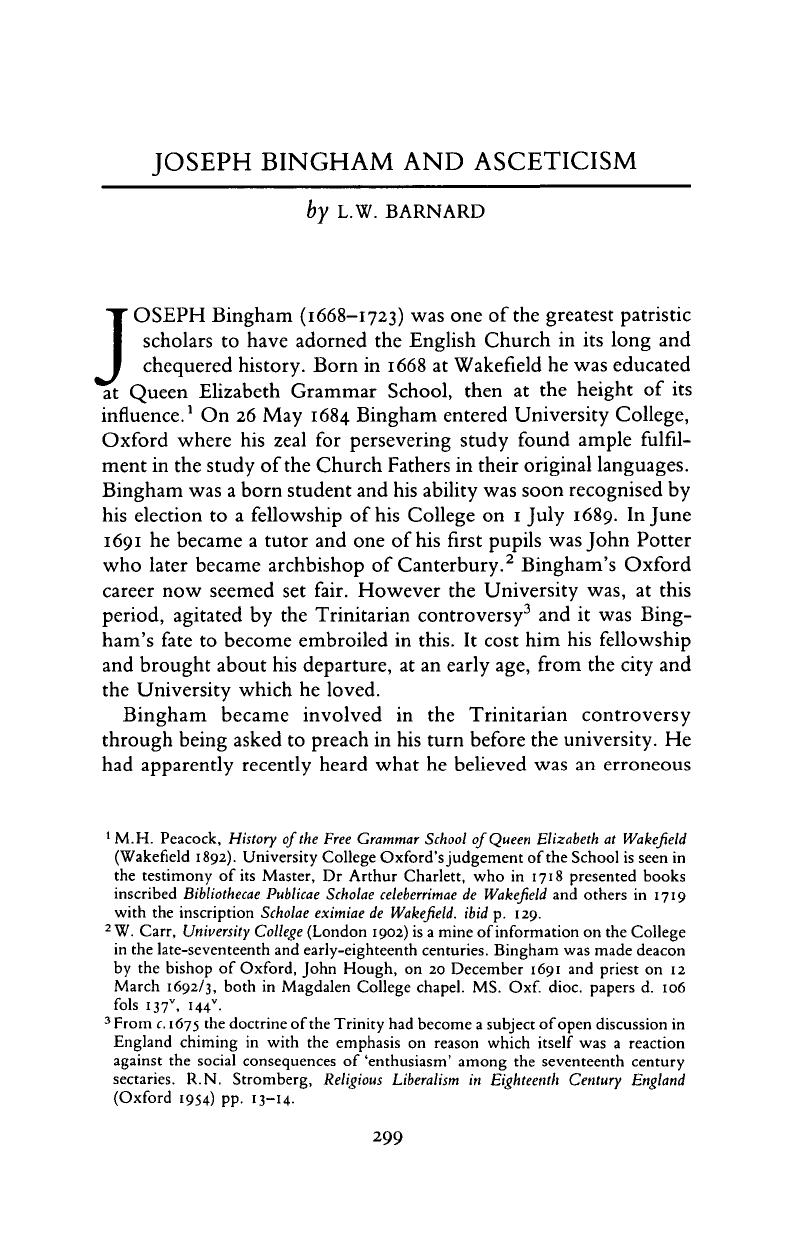No CrossRef data available.
Article contents
Joseph Bingham and Asceticism
Published online by Cambridge University Press: 21 March 2016
Abstract

- Type
- Obituary
- Information
- Studies in Church History , Volume 22: Monks, Hermits and the Ascetic Tradition , 1985 , pp. 299 - 306
- Copyright
- Copyright © Ecclesiastical History Society 1985
References
1 Peacock, M.H., History of the Free Grammar School of Queen Elizabeth at Wakefield (Wakefield 1892)Google Scholar. University College Oxford’s judgement of the School is seen in the testimony of its Master, Dr Arthur Charlett, who in 1718 presented books inscribed Bibliothecae Publicae Scholae celeberrimae de Wakefield and others in 1719 with the inscription Scholae eximiae de Wakefield, ibid p. 129.
2 Carr, W., University College (London 1902)Google Scholar is a mine of information on the College in the late-seventeenth and early-eighteenth centuries. Bingham was made deacon by the bishop of Oxford, John Hough, on 20 December 1691 and priest on 12 March 1692/3, both in Magdalen College chapel. MS. Oxf. dioc. papers d. 106 fols 137v, 144v.
3 From c. 1675 the doctrine of the Trinity had become a subject of open discussion in England chiming in with the emphasis on reason which itself was a reaction against the social consequences of ‘enthusiasm’ among the seventeenth century sectaries. R.N. Stromberg, Religious Liberalism in Eighteenth Century England (Oxford 1954) pp. 13–14.
4 The sermon is printed by R. Bingham in his edition of The Works of The Rev. Joseph Bingham M.A. vol 10 (Oxford 1855) pp. 361–383 subsequently cited as Works. On Bingham’s expulsion from Oxford Works vol. 1 pp. xviii-xix. Bingham resigned his Fellowship on 23 November 1695. No trace of a formal decision against Bingham has survived in the University records apart from this note in the Life of Anthony à Wood prefixed to Athenae Oxonienses (ed Bliss p. 123): ‘the meeting about Mr. Bingham is tomorrow morning at nine of the clock’. This note is dated All Souls Coll. Oxon 24 Nov. 1695. It is possible that no formal public censure by Convocation was ever passed and that Bingham withdrew voluntarily. See however Archbishop Tenison to the Vice-Chancellor Adams 24 December 1695; BL, Add. mss. 799 fol 149 on the complaint that Bingham’s sermon was contrary to the doctrines of the Catholic Church and the Church of England.
5 Works 10, pp. 353–360.
6 Ibid p. 358.
7 Works vols 1–8. vol 9 contained his The Scholastic History of Baptism by laymen and a Dissertation on the Eighth Nicene Canon, vol 10 has Bingham’s The French Church’s Apology for the Church of England and Sermons on the Trinity, the Divinity of Christ and other matters.
8 For Bingham’s eloquent tribute to Morley Works 1 pp. xlv-xlvi and the further tribute in 1 p. lxxxv.
9 The record of the grant of a dispensation to hold Havant in plurality with Headbourne Worthy, November 1712, is in Lambeth Palace Library.
10 The Origines Ecclesiasticae was begun in 1702 and the first three volumes were published in 1708–11. Bingham was then diverted into the controversy over lay-baptism and other matters. He resumed the publication of the Origines in 1715 and the remaining volumes appeared at intervals up to 1722. The work was translated into Latin and published by J.H. Grischovius of Halle in 1724–9. An abridgement in German was issued anonymously at Augsburg in 1788–96.
11 Bibliography of The Later Roman Empire (Oxford 1964).
12 Works vol 2 p. 321.
13 Ibid pp. 323–397.
14 Ibid p. 330.
15 Ibid pp. 331–333.
16 Ibid p. 344.
17 Ibid p. 359.
18 Ibid pp. 365–366.
19 Ibid pp. 373–374.




